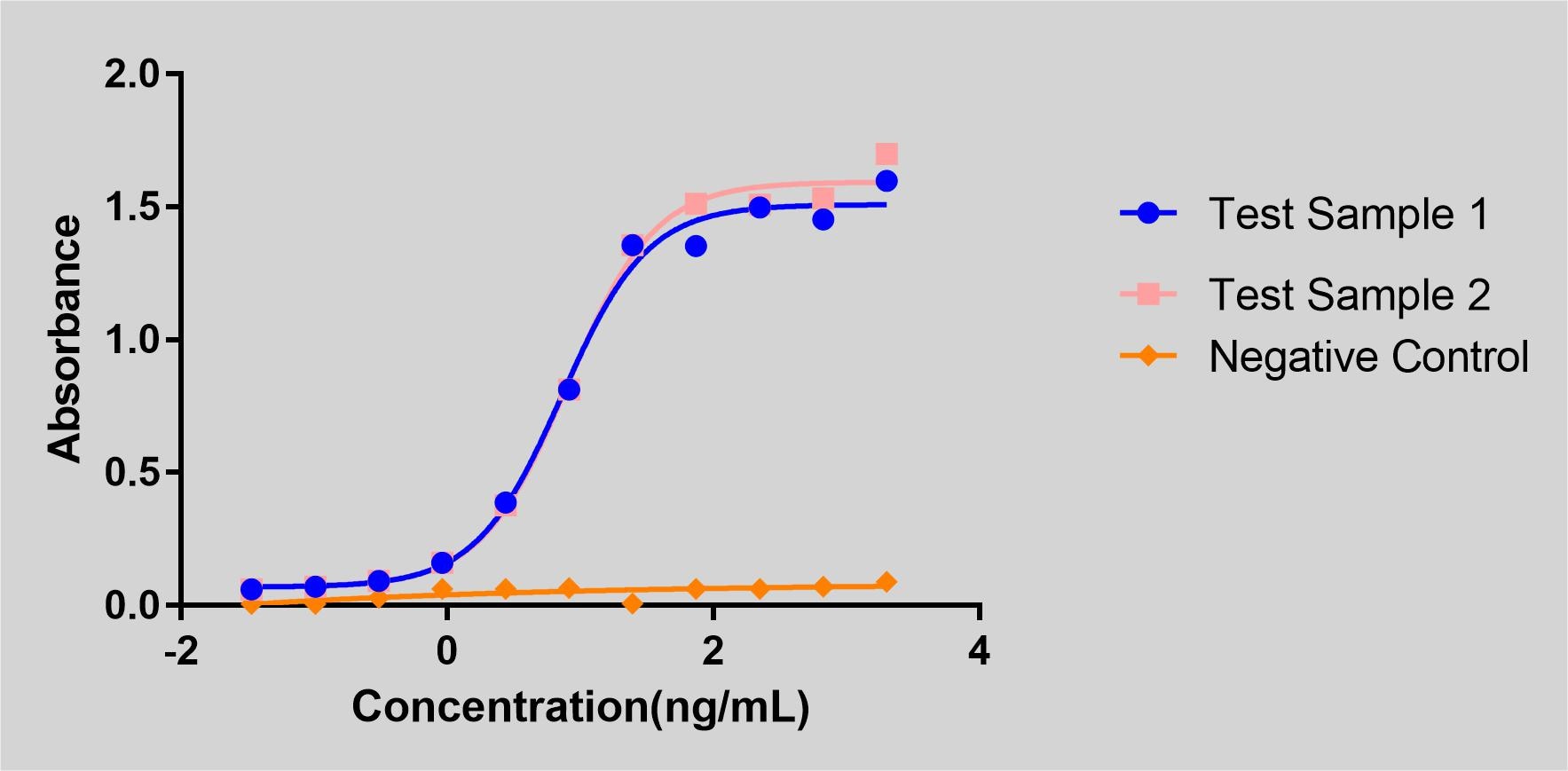Recombinant Human MIS RII Fc Chimera Protein, CF Summary
Product Specifications
| Human MIS RII (Pro18 - Ser144) Accession # Q16671 |
DIEGRMD | Human IgG1 (Pro100 - Lys330) |
| N-terminus | C-terminus | |
Analysis
Product Datasheets
Carrier Free
CF stands for Carrier Free (CF). We typically add Bovine Serum Albumin (BSA) as a carrier protein to our recombinant proteins. Adding a carrier protein enhances protein stability, increases shelf-life, and allows the recombinant protein to be stored at a more dilute concentration. The carrier free version does not contain BSA.
In general, we advise purchasing the recombinant protein with BSA for use in cell or tissue culture, or as an ELISA standard. In contrast, the carrier free protein is recommended for applications, in which the presence of BSA could interfere.
4749-MR
| Formulation | Lyophilized from a 0.2 μm filtered solution in PBS. |
| Reconstitution | Reconstitute at 100 μg/mL in sterile PBS. |
| Shipping | The product is shipped at ambient temperature. Upon receipt, store it immediately at the temperature recommended below. |
| Stability & Storage: | Use a manual defrost freezer and avoid repeated freeze-thaw cycles.
|
Reconstitution Calculator
Background: MIS RII
Human MIS RII (Mullerian inhibiting substance type II receptor), also known as AMHRII (anti-Mullerian hormone type II receptor), is an 82 kDa serine/threonine receptor with a single transmembrane domain that belongs to the family of type II receptors of the TGF-beta superfamily (1). The MIS RII precursor is 573 amino acids (aa) in length, with a 17 aa signal sequence, a 127 aa extracellular region that also contains two potential N-linked glycosylation sites, a 26 aa transmembrane region, and a 403 aa cytoplasmic region that contains the serine/threonine kinase domain (1). Human MIS RII shares 82%, 78%, and 77% aa sequence identity with rabbit, mouse, and rat MIS RII, respectively. It is expressed in the mesenchyme surrounding the fetal Mullerian duct, in fetal and postnatal granulosa cells, and in Sertoli cells (1 - 6). MIS RII is a receptor for Mullerian inhibitor substance (MIS), also known as anti-Mullerian hormone (AMH), which is responsible for regression of the Mullerian duct, the anlagen of the uterus, Fallopian tubes, and upper vagina in male fetuses (1 - 6). Mutations in MIS RII result in persistent Mullerian duct syndrome (PMDS), an extremely rare form of pseudohermaphroditism (5, 6).
- Imbeaud, S. et al. (1995) Nat. Genet. 11:382.
- Baarends, W.M. et al. (1994) Development 120:189.
- di Clemente, N. et al. (1994) Mol. Endocrinol. 8:1006.
- Teixeira, J. et al. (1996) Endocrinology 137:160.
- Salhi, I et al. (2004) Biochem. J. 379:785.
- Imbeaud, S. et al. (1996) Hum. Mol. Genet. 5:1269.
Citation for Recombinant Human MIS RII Fc Chimera Protein, CF
R&D Systems personnel manually curate a database that contains references using R&D Systems products. The data collected includes not only links to publications in PubMed, but also provides information about sample types, species, and experimental conditions.
1 Citation: Showing 1 - 1
-
Soluble Endoglin Specifically Binds Bone Morphogenetic Proteins 9 and 10 via Its Orphan Domain, Inhibits Blood Vessel Formation, and Suppresses Tumor Growth.
Authors: Castonguay R, Werner ED, Matthews RG, Presman E, Mulivor AW, Solban N, Sako D, Pearsall RS, Underwood KW, Seehra J, Kumar R, Grinberg AV
J. Biol. Chem., 2011-07-07;286(34):30034-46.
Species: Human
Sample Types: Recombinant Protein
Applications: Surface Plasmon Resonance
FAQs
No product specific FAQs exist for this product, however you may
View all Proteins and Enzyme FAQsReviews for Recombinant Human MIS RII Fc Chimera Protein, CF
Average Rating: 5 (Based on 1 Review)
Have you used Recombinant Human MIS RII Fc Chimera Protein, CF?
Submit a review and receive an Amazon gift card.
$25/€18/£15/$25CAN/¥75 Yuan/¥2500 Yen for a review with an image
$10/€7/£6/$10 CAD/¥70 Yuan/¥1110 Yen for a review without an image
Filter by:


